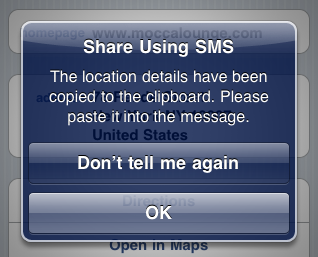 Our last Where To? update was the first update to go through Apple’s automated private API usage detector Craig Hockenberry noticed recently. No wonder, this tool found one match we introduced four updates ago and falsely didn’t consider as a problem. The method is named setNumberOfRows: and allows placing two buttons in an alert below each other instead of beside each other.
Our last Where To? update was the first update to go through Apple’s automated private API usage detector Craig Hockenberry noticed recently. No wonder, this tool found one match we introduced four updates ago and falsely didn’t consider as a problem. The method is named setNumberOfRows: and allows placing two buttons in an alert below each other instead of beside each other.
What was interesting though: Apple didn’t reject the update but just asked to resolve the issue at the next update. To me that’s a new spin to the whole App Store review debate and I must admit that I like the approach. Still, it’s debatable why such a useful functionality to create alert buttons with slightly longer labels is a private API. But leaving that aside I value Apple’s approach to solve those kind of minor issues in a low-key manner that doesn’t lead to silly resubmissions and loosing valuable time.
After all, it’s in Apple’s best interest to avoid burdening the review team the loads of resubmissions by giving the developer the time to fix the issue at the next update.
9 Comments
Comments are closed.
@uliwitness via Twitter
RT @futuretap: Semi-reject: a new measure in the App Store Review process? http://bit.ly/5kpew5
[Oh wow. Some sense!]
@CocoaGeek via Twitter
RT @futuretap: Semi-reject: a new measure in the App Store Review process? http://bit.ly/5kpew5 << Isolated case or process improvement?
@mnemonicfx via Twitter
Semi-reject: a new measure in the App Store Review process? http://bit.ly/5kpew5 (via @futuretap)
@36peas via Twitter
RT @CocoaGeek: RT @futuretap: Semi-reject: a new measure in the App Store Review process? http://bit.ly/5kpew5 << process improvement?
@piercyha via Twitter
RT @uliwitness: RT @futuretap: Semi-reject: a new measure in the App Store Review process? http://bit.ly/5kpew5 [Oh wow. Some sense!]
Andy
I hope you’ve submitted a radar if you want to see this API made public ?
Ortwin Gentz
Andy, absolutely: http://openradar.appspot.com/7456121
Feel free to file a dupe!
Devin Ross
Its cool to see Apple try to make the app store review process quicker. From my experience, the review time is getting quicker. (Maybe thats b/c I expect it to take a month to get a app approved). I’ve always wondered how people find out whats in the private api. Got any ideas?
Ortwin Gentz
Devin, yeah this time the review time was rather short (7 days).
There are several ways to find out what’s in the private API: Using “class-dump” is one method and there are several online sources and books (for example “The iPhone Developer’s Cookbook” by Erica Sadun) that cover this topic. I think it’s harder to determine whether a project uses any private APIs. Apple doesn’t publish its internal checking tool so devs have to find out themselves.